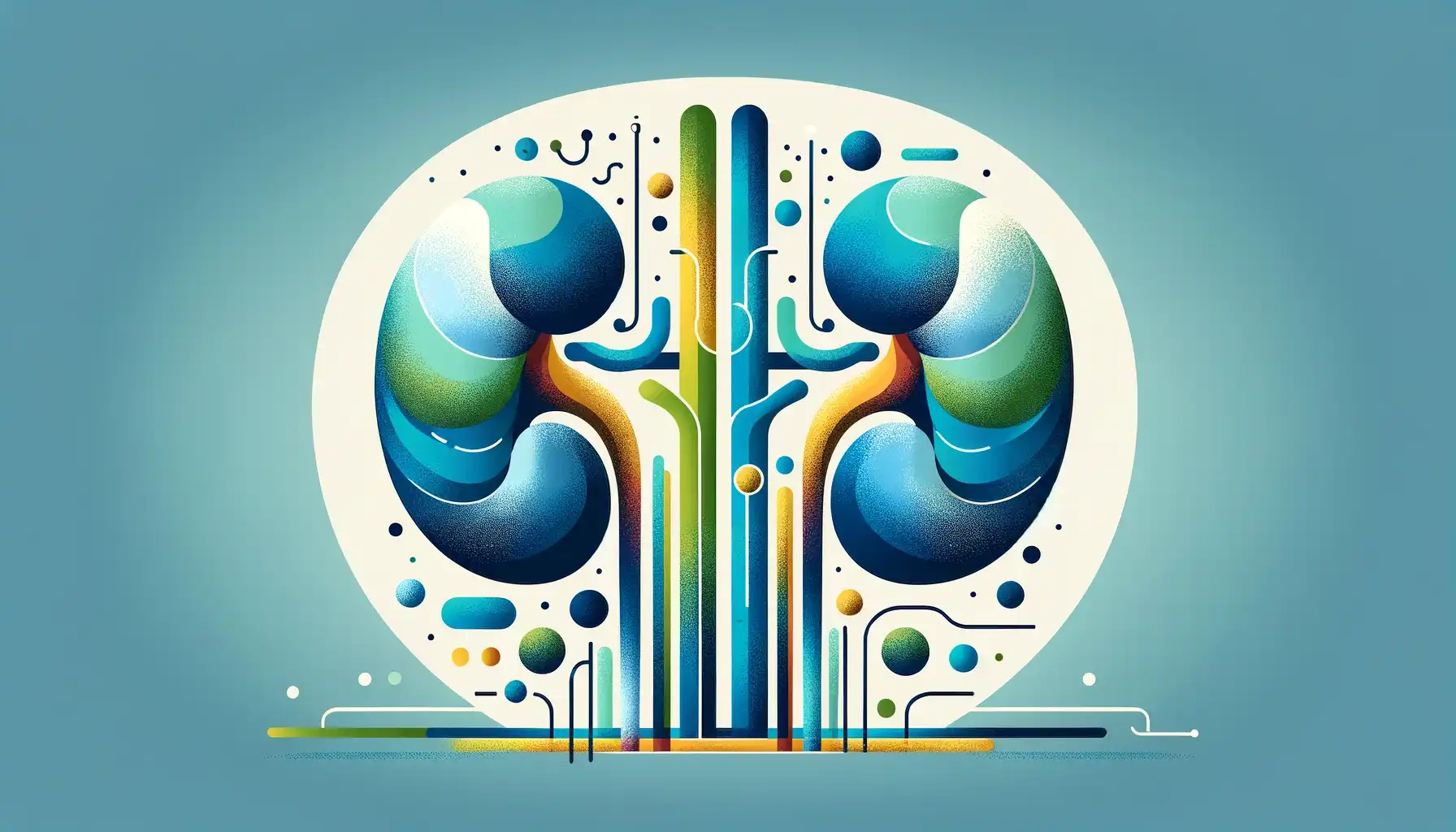


Kidney function serves as a critical indicator of overall health, reflecting the body's ability to filter waste and maintain proper fluid balance. Several blood markers play pivotal roles in assessing kidney health. Cystatin C, a protein produced by cells throughout the body, serves as a reliable marker of kidney function, often more sensitive than creatinine in detecting early kidney dysfunction. Creatinine, a waste product from muscle metabolism, is commonly measured to evaluate kidney filtration rates. eGFR (estimated glomerular filtration rate) provides an estimate of the kidneys' filtering capacity based on creatinine levels. Urea, a byproduct of protein metabolism, reflects the kidneys' ability to excrete waste. Monitoring these blood markers offers valuable insights into kidney health, aiding in the early detection and management of renal disorders.
Cystatin C: a protein produced by cells throughout the body, serves as a sensitive marker for kidney function. Unlike creatinine, which may be influenced by muscle mass and diet, cystatin C levels are less affected by external factors, making it particularly valuable for assessing kidney health. Cystatin C is freely filtered by the glomeruli in the kidneys and is reabsorbed and catabolized in the proximal tubules. As a result, elevated levels of cystatin C in the blood often indicate decreased kidney function or impaired glomerular filtration rates. Its sensitivity to subtle changes in kidney function makes cystatin C a useful marker for detecting early stages of kidney dysfunction and monitoring progression over time.
Creatinine: a waste product generated by muscle metabolism, is a crucial marker used to evaluate kidney function. Normally, creatinine is filtered out of the blood by the kidneys and excreted through urine at a relatively constant rate. Elevated levels of creatinine in the blood suggest impaired kidney function or decreased glomerular filtration rates. Unlike cystatin C, creatinine levels may be influenced by factors like muscle mass and dietary intake of meat, which can complicate its interpretation. Despite these limitations, creatinine remains a widely used marker due to its reliability and availability. It serves as a key indicator in assessing kidney health, helping clinicians diagnose conditions such as chronic kidney disease and monitor the progression of renal dysfunction over time.
eGFR: estimated Glomerular Filtration Rate (eGFR) is a critical parameter used to assess kidney function and is calculated based on blood creatinine levels (but more commonly, as it's often deemed more accuract, on Cystatin C levels), age, gender, and other factors. eGFR reflects the rate at which blood is filtered by the glomeruli per unit of time, providing valuable insights into overall kidney health. A lower eGFR value typically indicates reduced kidney function, as the kidneys struggle to filter waste products effectively from the bloodstream. This decline in kidney function can be indicative of various kidney disorders, including chronic kidney disease (CKD) and acute kidney injury (AKI).
Urea: a waste product formed during the breakdown of proteins in the liver, plays a crucial role in assessing kidney function. As the kidneys filter blood, they remove urea and other waste products, excreting them from the body through urine. Elevated levels of urea in the blood, known as uremia, often indicate impaired kidney function or reduced glomerular filtration rate (GFR). Urea levels can rise due to various factors, including kidney damage, dehydration, high protein intake, and certain medical conditions like kidney disease or heart failure.
Too High levels of Cystatin C, Creatinine, estimated glomerular filtration rate (eGFR), or Urea may indicate certain health conditions related to the kidneys. The following are symptoms, signs, and consequences of excessively high levels of these kidney function markers:
Too Low levels of Cystatin C, Creatinine, estimated glomerular filtration rate (eGFR), or Urea may also indicate health issues related to the kidneys. The following are symptoms, signs and consequences of excessively low levels of these kidney function markers:
An optimal diet for maintaining kidney health and supporting the balance of renal markers like cystatin C, creatinine, eGFR, and urea typically emphasizes several key principles. First and foremost, it's essential to maintain adequate hydration by drinking plenty of water throughout the day, which helps in flushing out toxins and waste products from the kidneys. Additionally, a diet rich in fruits and vegetables, whole grains, and lean proteins, while low in sodium, saturated fats, and processed foods, is beneficial. Consuming foods high in antioxidants, such as berries, leafy greens, and bell peppers, can help combat inflammation and oxidative stress in the kidneys. Moderating intake of protein, particularly from animal sources, and limiting phosphorus and potassium-rich foods, is also crucial for individuals with compromised kidney function.
Omega-3 (EPA + DHA) | [more info] Omega-3 fatty acids may contribute to improved kidney function by reducing inflammation and supporting the health of blood vessels, potentially benefiting markers such as cystatin C, creatinine, eGFR, and urea.
Vitamin D | [more info] - a fat-soluble vitamin synthesized in the skin upon exposure to sunlight or obtained from dietary sources, helps regulate calcium and phosphorus levels, which are vital for bone health and may indirectly impact kidney function.
Vitamin C | [more info] - a water-soluble vitamin abundant in fruits and vegetables, acts as a potent antioxidant, protecting the kidneys from oxidative damage and inflammation, thus supporting their optimal performance and the maintenance of renal markers.
Coenzyme Q10 | [more info] a vital compound found in every cell of the body, may offer potential benefits for kidney function markers like cystatin C, creatinine, eGFR, and urea by supporting cellular energy production and antioxidant defense mechanisms, thereby promoting overall kidney health.
Vitamin B6 | [more info] like B12, B6 is a water-soluble vitamin that serves as a cofactor in numerous enzymatic reactions involved in amino acid metabolism, neurotransmitter synthesis, and immune function. Adequate levels of these vitamins support metabolic pathways involved in renal health.
Vitamin B12 | [more info] like B6, B12 is an essential water-soluble vitamin, plays a pivotal role in various physiological processes, including DNA synthesis, red blood cell formation, and neurological function. Adequate levels of these vitamins support metabolic pathways involved in renal health.
Cardiovascular Exercise: Engaging in regular aerobic activities, such as walking, jogging, swimming, or cycling, enhances blood circulation and cardiovascular function, which, in turn, supports kidney function by ensuring efficient delivery of oxygen and nutrients to renal tissues. Moreover, cardiovascular exercise helps regulate blood pressure, cholesterol levels, and blood sugar, which are crucial factors in maintaining kidney health and preventing conditions like chronic kidney disease (CKD).
Resistance Training: This form of exercise helps maintain muscle mass, which is essential for overall metabolic health and insulin sensitivity. Additionally, resistance training can aid in weight management by increasing metabolism and promoting fat loss while preserving lean muscle tissue. By improving body composition and metabolic parameters, resistance training indirectly supports kidney health and contributes to the prevention of conditions like obesity and metabolic syndrome, which are risk factors for kidney disease.
Weight Management: Weight management plays a crucial role in kidney health and can positively impact markers like cystatin C, creatinine, eGFR, and urea. Excess body weight, especially visceral fat, can contribute to insulin resistance, inflammation, and metabolic dysfunction, all of which are associated with kidney damage and impaired function. By maintaining a healthy weight through a balanced diet and regular physical activity, individuals can reduce the risk of developing conditions like diabetes, hypertension, and cardiovascular disease, which are major contributors to kidney problems. Weight management strategies include adopting a nutritious and portion-controlled diet, engaging in regular physical activity, and practicing mindful eating habits.
Alcohol Intake: Alcohol can lead to dehydration, electrolyte imbalances, and increased blood pressure, all of which can strain the kidneys and impair their function over time. Chronic alcohol consumption is also associated with kidney inflammation, fibrosis, and an increased risk of kidney disease.
Smoking Cessation: Similarly, smoking is a significant risk factor for kidney damage and dysfunction. The toxins in cigarette smoke can cause narrowing of the blood vessels, reduced blood flow to the kidneys, and oxidative stress, which can lead to kidney injury and decline in function.
Please note that the reference ranges for Cystatin C, Creatinine, eGFR and Urea only give a broad guide and a unique goal based on one's individual health conditions is best devised by working closely with a medical professional.
Moreover, it is imperative that any recommendations be implemented under the supervision of a medical professional, commencing at a conservative modification/dose and incrementally titrating up to the recommended effective modification/dose only in the absence of any adverse symptoms or signs.